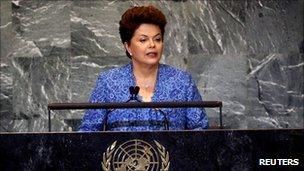Brazil's President Dilma Rousseff urges reform at UN
- Published

President Rousseff was making her debut at the UN
Brazilian President Dilma Rousseff has demanded a greater role for emerging nations in addressing the global economic crisis.
"This crisis is too serious to be managed by a small group of countries," Ms Rousseff said in an address to the UN General Assembly in New York.
She reiterated Brazil's desire to become a permanent member of the UN Security Council.
It is the first time a woman has opened the debate at the UN General Assembly.
To loud applause, Ms Rousseff said she was convinced that the 21st century would be the "century of women".
She also repeated Brazil's support for full UN recognition of a Palestinian state, saying "only a free Palestine can address Israel's security concerns".
'Upheaval'
But the main focus of her speech was on the need for concerted action to tackle the economic crisis, and for reform of international institutions to reflect the shifting balance of global power.
The world was facing an economic crisis which could turn into "serious political and social upheaval" if it was not met with "collective, rapid and genuine solutions," Ms Rousseff said.
She blamed "a lack of political resources and clarity of ideas" and said the challenge was to "replace outdated theories from an old world with new approaches from a new world".
Brazil was "willing and ready to help, while there is still time, those countries where the crisis is already acute," Ms Rousseff added.
Along with Russia, India, China and South Africa is a member of the Brics group of emerging economies, which on Thursday are due to consider a proposal to buy European bonds to help ease the debt crisis in the Eurozone.
Legitimacy
President Rousseff also reiterated Brazil's demand for reform of multilateral financial institutions such as the IMF and World Bank - currently dominated by the US and Europe - to give a greater role to emerging economies.
And she said the legitimacy of the UN Security Council depended on its being reformed to reflect "contemporary reality" by bringing in more developing countries.
Brazil was ready to "assume its responsibilities" as a permanent member of the Security Council, she added.